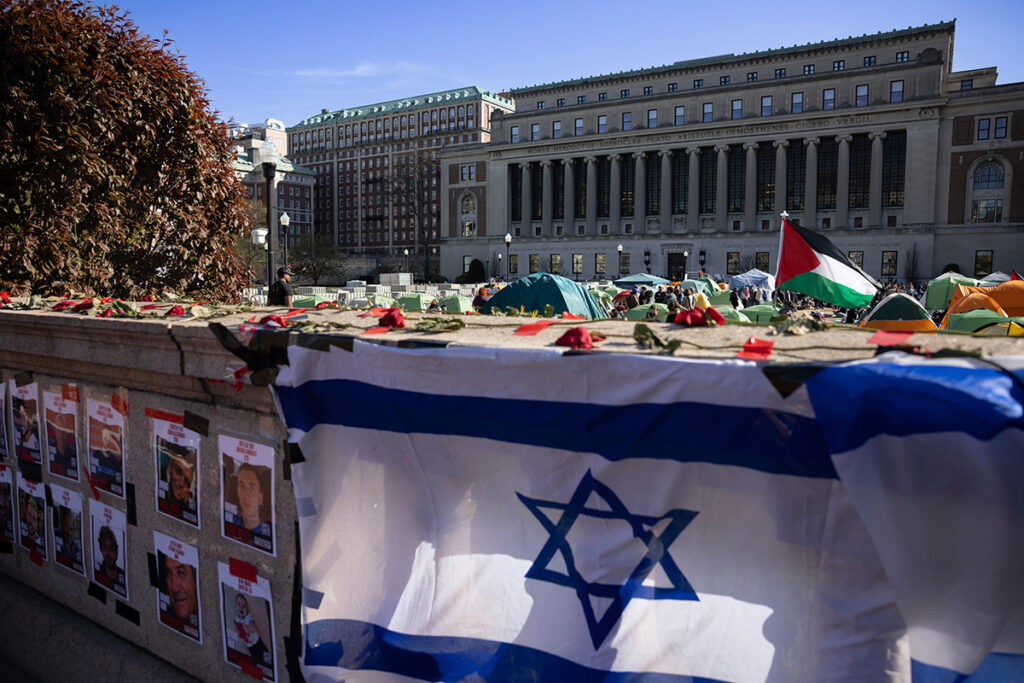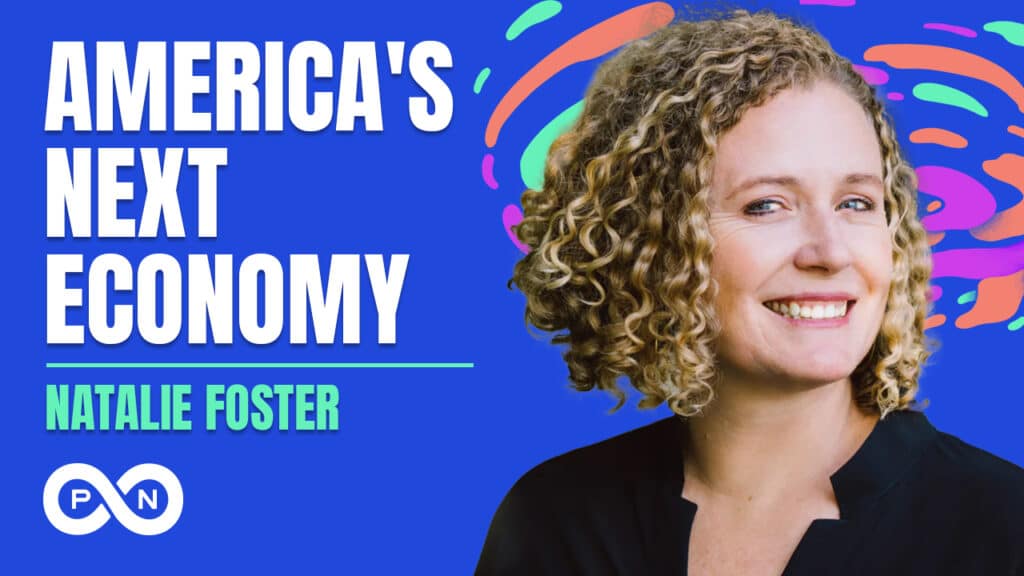Volcanoes are erupting in The Philippines, but on-fire Australia received some welcome rain. The Iran war cries have been called off and The Donald’s military powers are about to be hamstrung by the Senate. Meanwhile, his impeachment trial is starting, and we’re all on Twitter for a front-row seat.
What Could Go Right? Dial Down the Tension
Coverage of campus protests tends to represent the extreme of any one side.
This is our weekly newsletter, What Could Go Right? Sign up here to receive it in your inbox every Thursday at 5am ET. You can read past issues here.
Dial Down the Tension

The discourse in the United States has gone from being fever pitch about the Israel-Hamas war to fever pitch about the campus protests over it. Lately, the conversation is less about the humanitarian crisis in Gaza, the US’ foreign policy in regard to Israel, or ceasefire negotiations, and more about why Columbia University decided to cancel its graduation ceremony.
As per usual, the most outrage-inducing stories, which highlight the very worst of both sides, often get the most play in mainstream media and on our social feeds.
For instance, did you hear about the Jewish student who was stabbed in the eye at one of the campus protests? She wrote about it for The Free Press: “I was stabbed in the eye last night on Yale University’s campus because I am a Jew.”
Or maybe you’ve seen any number of videos or social media posts that give the impression that the general character and message of the protests are not pro-Palestine but pro-Hamas, with lone individuals yelling “We are all Hamas” or carrying the Hamas flag.
We get into trouble when we don’t ask ourselves how much these attention-grabbing events may overstate or overrepresent a facet of the situation.
You might think from the Yale student’s description, for instance, that she was deliberately targeted and violently attacked. What actually happened (which she does go on to clarify in the article) is that she was poked in the eye with a small flag that a protester passing by was waving.
And it’s not clear that explicitly pro-Hamas protestors are even college students. Whether they are or not, they’re a tiny minority.
That doesn’t mean that the underlying concerns these examples represent, as well as many others about the protests, aren’t real. I’ll restate that since emotions are running so high about these issues: I am in no way claiming that problems don’t exist, or concern isn’t merited. There really is anti-Semitism on campus and elsewhere. Protesters really have crossed lines, become aggressive, and displayed a comical lack of self-awareness. Police really have resorted to excess force in response, and universities to trickery.
But I think this frenzied media environment is harmful. One, because the conversation has turned away from the actual Israel-Palestine issue to students who will, at the end of the day, have a minor (if any) impact on how the war plays out. Two, because it amps up fear, anger, scorn, and a host of other hot emotions with little to show for it. Three, because it flattens and concretizes narratives about various groups—“privileged college students,” “leftists,” “anti-Semites,” “Jews,” “racists,” “fascist cops,” and so on—and makes it easier to mentally slot our fellow Americans into them. And four, because the outsized attention leads us to overestimate how much the US is being “torn apart” by yet another issue.
In fact, only a sliver of college students have participated in the protests: eight percent, according to a new survey of college students by Generation Lab. Majorities of those surveyed also oppose controversial protest tactics like occupying campus buildings and blocking pro-Israel students from parts of campus.
And while the media has been flush with pieces over how much the youth’s devotion to the Israel-Palestine issue will hurt President Biden in the election, the latest Harvard Youth Poll found that it ranked at the bottom of their concerns, along with student debt. (Inflation, healthcare, and housing came out on top.)
Much rarer to find are articles like this one from NPR, which details the agreements several schools have peacefully made with student protestors.
Of course, we all have opinions about what is happening on campuses right now. But we can do our part in dialing down the tension simply by being aware that most of what we see online represents the extreme of any one side. We can also turn our gaze back to the realities the protests were meant to call attention to in the first place.
Or, we could take a note from one nonobservant Jewish student at Columbia, who expressed to a reporter from The Atlantic that it is a privilege to be on a campus with students from both Israeli/Jewish and Arab/Muslim backgrounds. “Some have lost families and loved ones,” he said. “I understand their anger and suffering.”
Update: The Centers for Disease Control and Prevention has reported that maternal mortality rates in the US dropped from 32.9 deaths per 100,000 live births in 2021 to 22.3 in 2022. In January, we wrote about a study calling the US’ high maternal mortality rate into question.
What Could Go Right? S6 E4

What is the cost of not investing in families in America? How can economic security be guaranteed? Zachary and Emma speak with Natalie Foster, president of the Economic Security Project and author of the new book The Guarantee: Inside the Fight for America’s Next Economy. Baby bonds, student loans, why so many Americans dislike dealing with the government, and raising the economic floor are among the topics discussed today. | Listen now
By the Numbers
88: The percent reduction in emissions, from 1990 levels, that modeling from the European Commission predicts can be reached by 2040 for the European Union. (The Economist $)
94: The percent of US fish stocks that are not subject to overfishing, according to a new federal report, an all-time low.
5K: The amount the Australian government is pledging—up to $1,500 in cash and $3,500 in goods and services—to help women leave situations of domestic abuse. (Critics say the money is too hard to access for victims, however.)
Quick Hits
🦠 Last year, we wrote about the first approved gene therapy for sickle cell disease. Its first commercial patient, a 12-year-old boy from Washington, just began treatment, which will be covered by his insurance. He hopes he will be cured so he can become a geneticist.
⚖️ Two Republicans joined with Democrats in Arizona’s Senate to repeal a law from 1864 that banned nearly all abortions, which went into effect there after a state Supreme Court ruling in April. Going forward, a 2022 law that allows abortion up until 15 weeks will remain in place.
🏠 In recent years, several states—including Oregon, Florida, Montana, and California—have attempted to ameliorate the housing crisis by updating zoning codes, transforming residential planning processes, and improving home-building and design requirements.
🔬 For the first time, researchers have found that a genetic marker—two copies of a particular gene—is an underlying cause in late-in-life Alzheimer’s. (Previously, genes were thought to only affect the types of Alzheimer’s that hit people at much younger ages.) The finding opens the door for research to develop gene therapy or drugs to target the offending gene.
🧬 A “ChatGPT for CRISPR”: a research team has published their new, open-source generative AI tool, trained on millions of protein sequences, that can help design gene-editing proteins used with CRISPR.
🌲 For The Dispatch, Will Rinehart makes the case that infrastructure in American cities has gotten better in part due to projects like New York City’s The High Line, Miami’s The Underline, and Dallas’ Klyde Warren Park that have reclaimed old infrastructure, from defunct metro lines to highways.
💡 Editor’s pick: An astrophysicist takes us through the history and current developments of searching the universe for alien life.
TPN Member Originals
(Who are our Members? Get to know them.)
- Gaza-Israeli peace will come only by putting people before states | WaPo ($) | Anne-Marie Slaughter
- The NPR controversy | Tangle | Isaac Saul
- The government moves to reclassify cannabis | Tangle | Isaac Saul
- The battle over TikTok’s future, explained | GZERO | Ian Bremmer
- Why a bit of restraint can do you a lot of good | The Atlantic ($) | Arthur C. Brooks
- The negative feedback loop that could ‘doom’ AI | Faster, Please! | James Pethokoukis
- Israel and Saudi Arabia are trading places | NYT ($) | Thomas L. Friedman
- How the US is destroying young people’s future | TED | Scott Galloway
- The blindness of elites | The Atlantic ($) | Thomas Chatterton Williams


